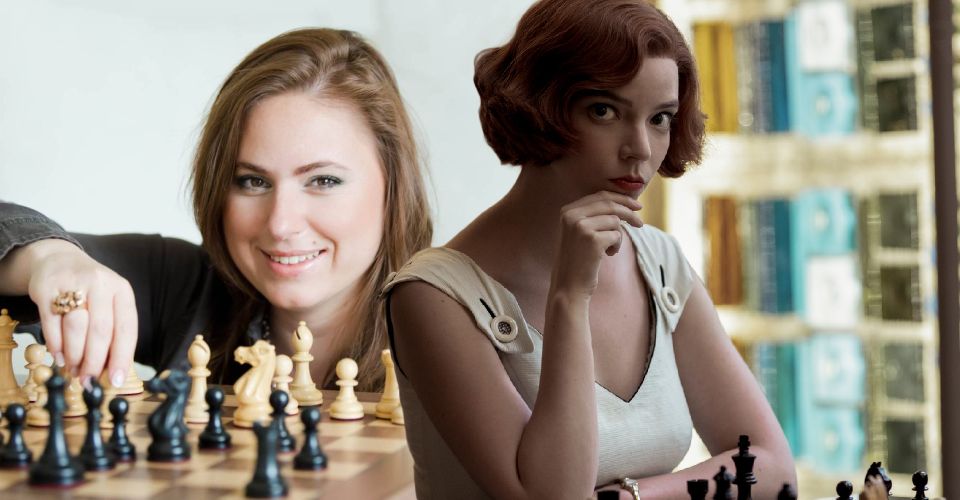The Queen’s Gambit In Real Life: The World’s Best Female Chess Players

Beth Harmon in Netflix’s latest original series, The Queen’s Gambit, isn’t a real-life chess player, but there have been multiple female grandmasters over the years. Although chess has been long dominated by male players, chess was a popular pastime of upper-class women from the Middle Ages through the 18th century, including Queen Elizabeth I and Mary, Queen of Scots. However, a woman would only receive the title of grandmaster for the first time in the late 1970s. Beth’s story is fictitious, but the ’70s and ’80s were still revolutionary times for women in chess.
In The Queen’s Gambit, Beth Harmon is a nine-year-old chess prodigy, capable of playing and winning against multiple opponents at the same time. As she grows older, Beth starts competing in local tournaments and she quickly rises in the ranks of chess players in the United States. Traveling with her adoptive mother, Beth wins international competitions and gains fame for her unique play style and gender. While the plot of The Queen’s Gambit is loosely based on a true story, the player who inspired her character was the male chess prodigy Bobby Fisher.
Like Beth, Fisher won his first U.S. title at the age of fourteen. At fifteen, he became a grandmaster in 1958 and dominated the chess scene during the 60s and 70s. Fisher was even able to win against Russian Boris Spassky during the World Chess Championship. However, Fisher’s emotional journey was probably very different from Beth’s, who had to deal with both her mothers’ deaths and needed to prove herself and earn the respect of her male peers. Instead, Beth might have more in common with the women listed below.
Nona Gaprindashvili

Nona Gaprindashvili was the first woman to be awarded the title of grandmaster in 1978. While she had already been a female world champion multiple times by then and won the title of female grandmaster, she also earned the (men’s) international grandmaster title after scoring two grandmaster norms, totaling 23 games against mostly other grandmasters. She’s still an active player and maintains a rating of 2270. In 2005, she won the BDO Chess Tournament held in the Netherlands at age 64.
Maia Chiburdanidze

Until 2010, Maia was the youngest Women’s World Chess Champion and she remained the world chess champion from 1978 to 1991. Like Beth, she learned the rules of chess at a young age, only 8, and she won her first women’s international tournament in 1974 when she was 13 years old. She received the title of woman grandmaster three years later, but would only be awarded the (men’s) international grandmaster in 1984. She was the second woman to receive that title, after Gaprindashvili. Another similarity Maia shares with Beth is that she has played extensively in men’s tournaments around the world, winning a few in the ’80s and ’90s.
Susan Polgar

Susan and her two sisters, Judit and Sofia, were part of an educational experiment carried by their father. He wanted to prove that geniuses were not born, but made, so he set out to train his daughters at chess. Notably, Susan won her first chess tournament at age of 4, playing against girls twice her age and coming out undefeated. At 12, she won the World Under 16 Girls Championship. However, Polgar mainly played in men’s tournaments and. At 17 she was the first woman to qualify for the Men’s World Championship, but did not compete because, according to Susan herself, FIDE (The International Chess Federation) and the Hungarian federation changed the rules to stop her from going to the championship. She received the title of grandmaster in 1991, the third woman to do so.
Judit Polgar

Judit Polgar, along with her sisters, was raised to be a chess prodigy. She’s generally regarded as the strongest female player ever and has won a game against a reigning number one male player along with multiple male world champions. Her sister, Susan, trained her from a young age, but eventually she surpassed Susan’s achievements. She’s the only woman to have ever made it to the top 10 list of the best chess players in the world. In fact, before she was 13, she was already considered to be one of the top 100 players.
Similar to Beth Harmon, Judit defeated people without needing to look at the chessboard and is described as having a very intense playing style. She also has red hair and was described by male adult opponents as having killer eyes and being a cute little girl capable of crushing them. Her performance was even said to be superior to Fisher’s when he was the same age. Another interesting fact is that Judit also had a rivalry with a Russian grandmaster, Garry Kasparov. Like Beth, she lost the first time she faced him but eventually made history by defeating him in 2002 during the Russia versus the Rest of the World Match.
Hou Yifan

Like many of the women on this list, Hou Yifan started playing chess very early in her life. At age 3, she was able to defeat her father and grandmother. She went on to be the youngest member of the national chess team and won her first championship. Just like Beth’s mother accompanied her to tournaments, Hou Yifan’s mother also traveled with her to many international competitions. However, Hou has chosen not to dedicate her life completely to chess as a career, preferring to lead a more balanced life. Despite continuing her studies and becoming a professor, she’s still the best ranking female player in the world and is listed as number 88 on the top 100 ranking of overall players.
Vera Menchik

Although Vera Menchik never received the title of grandmaster, she was the first women’s chess champion and earned her fame by competing against male chess masters, including by winning against world champion Max Euwe. She held her title of women’s world champion for over 17 years, dominating her other female opponents. She died during World War II, long before the grandmaster title was created. However, her legacy is still alive as the trophy of the Women’s Chess Olympiad is called the Vera Menchik Cup.
About The Author

















